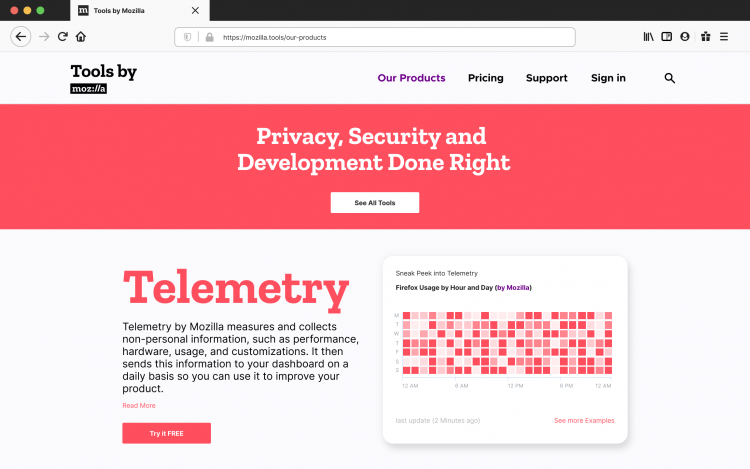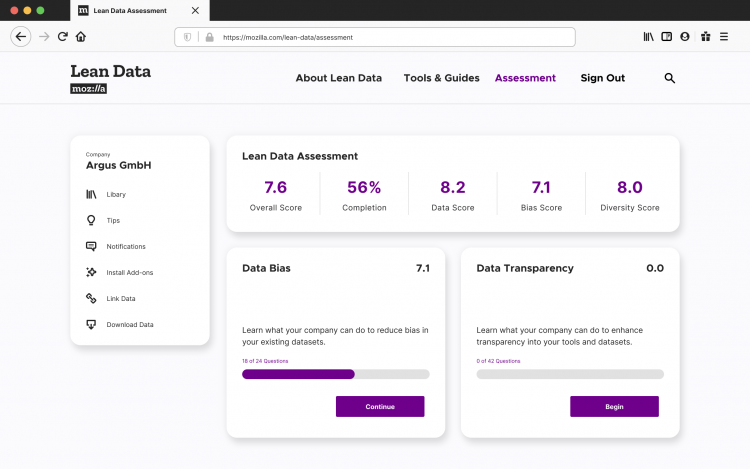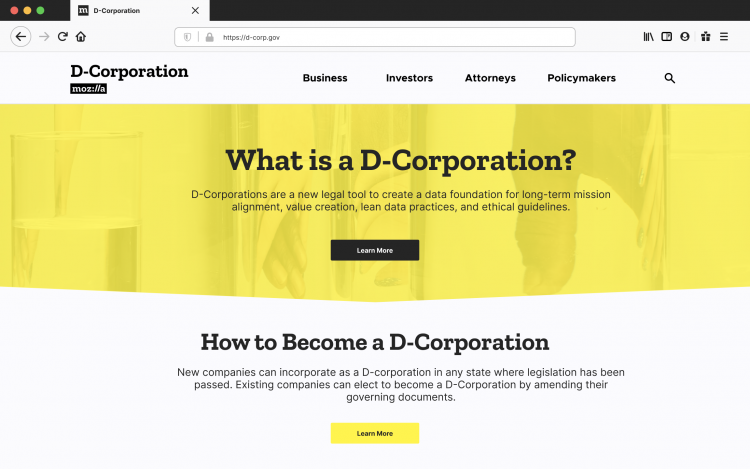State Of The Internet/Surveillance Economy/mozillaasaservice
Mozilla As a Service
Productizing our healthier data practices and infrastructure and galvanizing a ‘better data’ movement.
The Problem to Solve
Compliance and good data practices are hard for most businesses. There are few options that don’t have surveillance baked in, and few incentives to make a meaningful movement in favor of lean data.
Businesses require data to function in today’s world.
Business owners all over the world, of all shapes and sizes, process and store their customers’ data everyday. From biomedical research companies to indie sneaker stores, global and local legislation is quickly making this essential function riskier. To a varying degree, this is rightly so, but how can smaller companies manage? Might well-intentioned regulation only enable more dominance by huge corporations, which can shoulder the cost and risk?
Policies and legislation are catching up.
Through legislation, people around the world, from India to Kenya to the UK, are being given ‘ownership’ of their data. However, requesting access to, understanding, and monitoring the implications of that data are nearly impossible.
But compliance and ‘good data’ practice is hard for businesses.
Both sides of this equation–businesses and citizens–would benefit from a technology platform that simplifies and creates tools around data collection, then basically templatizes the storage and processing of data, in a way that is easily accessed and monitored.
Overall Approach
By providing clean and lean data tools, certifications, and legal incentives we can fuel a bigger movement in which businesses are lean data adherents from day one and in which people’s data isn’t preemptively hoarded.
Help level the compliance playing field
For smaller companies, increasing policy and compliance requirements affects them disproportionately. Just one third of global startups were deemed GDPR-compliant (versus 70% of enterprises).
Provide new lean data tools that lower risk and boost brand
For companies, they often use the least expensive or easiest data tools available to them. These are often surveillant ones. New, reputable tools and certification could bring market differentiation.
Incentivize good data practice with new legal class of business
Think: the data equivalent of the B-Corp.
Tactics to Explore
Creating platforms and services that turn Mozilla’s internal data infrastructure into products/services, assess and certify business data practices, and eventually establish a new class of business.
Assumptions to Test
If we can productize our healthier data practices and infrastructure to galvanize a ‘better data’ movement, we can...
Reduce Exposure…
With lean data practices harvesting less data from people.
Reduce Exclusion…
By helping smaller players–as well as bigger ones introducing data practices to their business–have new options for better practices.
Reduce Exploitation...
No longer will companies have their hand forced in relying on the default surveillance tactics of big-player data tools that are available.
Phase 1: Diving In: Turn Internal Data Infrastructure into Products/Services
Imagine Mozilla telemetry as a service, making it easier for businesses to do the right thing. We could change the game around transparency, access, and ownership by helping other companies copy our leading best practices—from how we capture, use, store, analyze, and monitor people’s data, to how we respond to CCPA and GDPR requests.
What problem does it solve?
For users, their lives are negatively impacted by businesses that often don’t have the capacity or tools to treat their data better.
For companies, they often use the least expensive or easiest tools available to them. These are often surveillant ones.
For smaller companies, increasing policy and compliance requirements affects them disproportionately. Just one third of global startups were deemed GDPR-compliant (versus 70% of enterprises).
How does it solve it?
A B2B play that spins out lean data practices, tools, and services, perhaps focused on new businesses and startups. It would allow new players to serve this part of the market, helping build a bigger movement in which people benefit from business’ lean data practices. Meanwhile, Mozilla could collect license fees from developers.
With whom might we work?
- Purpose-driven VCs
- Github or other source-control parties
- The Omidyar Network and their cohort of VCs who want their companies to lower their data risk, and who see the move towards greater transparency and user-control as a differentiator.
How could we start?
Explore how to productize our existing privacy-preserving data science platform and figure out how to handle consent.
Phase 2: Building Momentum: Assessing and Certifying Business Practices
Imagine Mozilla—perhaps in coordination with other organizations—recognizing and certifying companies’ leaner, smarter data efforts with a seal of assurance.
What problem does it solve?
For people, assurances about which companies they can trust with their data would be appreciated. In a global IBM poll, only 20% of respondents “completely trust” the companies they interact with to maintain their data privacy.
For companies, reputable certification could bring market differentiation.
How does it solve it?
A B2B product offering corporate assessment and certification would take lean data beyond good practice into good business—a branded movement driving consumer demand for better data practices.
With whom might we work?
- Regulators, especially the German competition authorities, who are leading the way in aligning market structure legislation with privacy and data protection.
- Reputable accreditation and ratings agencies.
- Organizations like Consumers Union.
How could we start?
How might we create an assessment for others to see how they compare to Mozilla's lean data practices?
Research ways to incentivize and certify application of the Mozilla’s standards and principles.
Phase 3: Reaching Our Destination: Establish D-Corporations
Imagine a new class of business, elevated by clean and lean data practices. These practices could be incentivized by effective regulation, perhaps coupled with tax breaks, as well as consumer demand and CSR pledges.
What problem does it solve?
For people, they would be protected by a cross-industry movement towards ‘best-in-class’ data practices.
For companies, going through D-Corp certification would help lower their risk while meeting growing consumer demand for companies whose products and services meet high standards for public benefit. Compare B-Corps, for example: 66% of consumers are willing to spend more for goods and services with this label.
How does it solve it?
There are interesting initiatives building towards ’lean data’ change across the industry, but they are siloed. Corralling and leading these efforts would bring credibility. There is no better player than Mozilla to do this, and we have many of the tools. By becoming the beacon, we would de facto set the standards.
With whom might we work?
- Regulators and policy makers
- Progressive/future forward VCs
- Organizations like B Lab
How could we start?
Meet with B Lab. Bring in a few like-minded partners.
Leverage Omidyar-led ‘Race to the Top’ meetings to float the idea
Comments, Stay Informed + Get Involved
Email: state-of-the-internet@mozilla.com
Join #stateoftheinternet on Slack (Staff + NDA Contributors)
Other Explorations
Powering-up Consent and Identity
Changing the consent conversation from “control over your privacy” to “power over your identity.”
Bringing new value, transparency, and power to the people through control and ownership.


